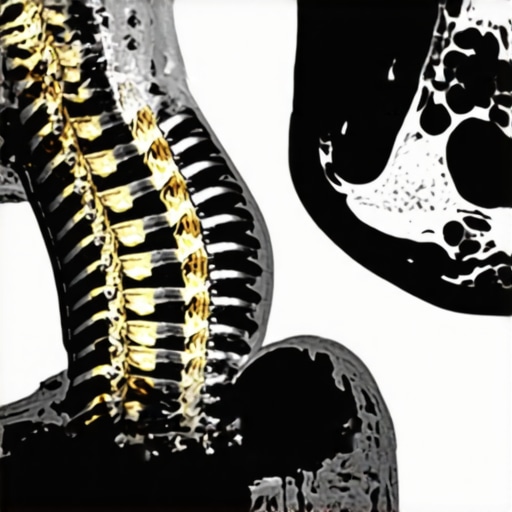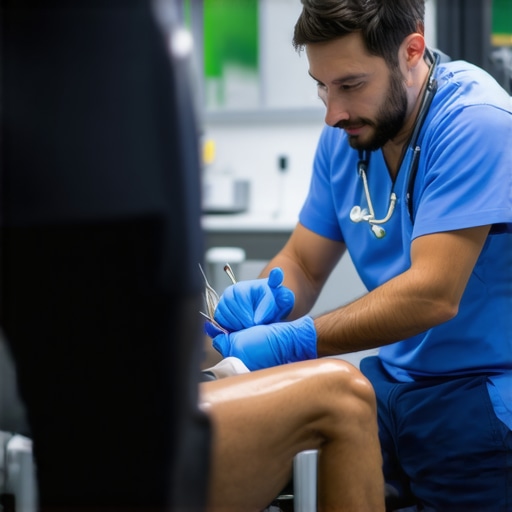My Unexpected Road to Recovery: An Honest Look at Car Accident Injuries and Orthopedic Evaluation in NJ
Last year, I found myself in a car accident that changed my life overnight. The sudden jolt left me with lingering pain and questions about my health. As someone who values quick and trustworthy medical care, I embarked on a journey through the world of orthopedic evaluations in NJ, discovering that timely, reliable assessments are crucial for recovery.
Deciphering the Signs: How I Knew It Was Time for a Professional Orthopedic Evaluation
Initially, I brushed off mild discomfort, thinking it was just typical soreness. However, as days passed, pain intensified, and I noticed numbness in my limbs. That’s when I realized I needed professional help. An orthopedic evaluation for car accident injury in NJ became my top priority to understand the extent of my injuries and prevent further damage.
What Makes a Fast, Reliable Orthopedic Evaluation So Vital?
From my experience, a comprehensive assessment—using advanced diagnostic tools like MRI and X-ray—can pinpoint issues quickly. I learned that early diagnosis not only accelerates recovery but also reduces risks of chronic pain or disability. I appreciated how NJ’s top orthopedic centers offer swift appointment scheduling, often the same day, which was essential for my peace of mind and health.
Personal Insights: The Journey from Injury to Recovery
During my evaluation, I was impressed by the professionalism and expertise of the orthopedic team. They explained every step and answered my questions, which made me feel more in control. Their recommendations ranged from non-surgical treatments, like physical therapy, to advanced options such as minimally invasive spine surgeries, when necessary. This experience reinforced how critical it is to choose experienced, trusted specialists—like those listed in top orthopedic spine specialists in NJ—for optimal care.
How Can I Ensure I Get the Best Orthopedic Care After a Car Accident?
To maximize recovery, I recommend seeking evaluation from certified orthopedic surgeons who understand personal injury cases deeply. Also, don’t hesitate to ask about orthopedic clearance for work release to return to daily life safely. Remember, early intervention is your best tool for a smoother recovery.
If you’ve experienced a similar situation, I invite you to share your story or ask questions in the comments below. Connecting with others who understand the journey can be incredibly comforting.
For more detailed insights, I found this authoritative resource on Mayo Clinic’s guide on spinal injuries helpful in understanding the importance of prompt, expert evaluation.
Understanding the Nuances of Orthopedic Evaluation after a Car Accident
When dealing with injuries from a car accident, a thorough orthopedic assessment is pivotal. Not only does it identify immediate issues like fractures or soft tissue damage, but it also uncovers hidden injuries that might develop into chronic problems if left untreated. Skilled orthopedic specialists in NJ utilize advanced diagnostic tools such as MRI and CT scans to ensure no detail is overlooked, facilitating a personalized treatment plan that aligns with your unique injury profile.
The Critical Role of Early Intervention in Long-Term Recovery
Research indicates that prompt evaluation significantly influences recovery outcomes, especially in spinal injuries and ligament tears. Early diagnosis allows for interventions that can prevent the progression of damage, reduce pain, and improve functional mobility. For example, minimally invasive procedures, when appropriate, can drastically shorten recovery times and minimize scarring, leading to quicker return to daily activities. For more detailed options, explore minimally invasive back pain treatments.
How Do Experts Determine the Best Treatment Path?
Orthopedic surgeons base their recommendations on a combination of diagnostic results, injury severity, and patient health status. Non-surgical options such as physical therapy and injections are often effective for managing pain and restoring function. However, in cases of severe instability or disc herniation, surgical interventions like lumbar fusion or laser spine surgery might be necessary. Trustworthy specialists, such as those listed in top NJ spine specialists, provide comprehensive care tailored to your injury.
What Are the Practical Steps to Ensure Quality Orthopedic Care Post-Accident?
Prioritize visiting certified orthopedic surgeons who understand the intricacies of personal injury cases. Be proactive by asking about orthopedic clearance for work release to facilitate your smooth return to work. Additionally, seek a second opinion if uncertain about recommended treatments. Staying informed about your injury and treatment options helps in making empowered decisions. Remember, early intervention combined with expert guidance optimizes your recovery trajectory.
If you’re navigating recovery, sharing your experience or seeking professional advice can be invaluable. Have you found particular treatments helpful or faced challenges during your journey? Share your story in the comments or ask questions to connect with others who understand your situation.
For further insights into effective recovery strategies, consider exploring rehabilitation tips after lumbar fusion to support your healing process.
Delving Deeper: How Orthopedic Assessments Uncover Hidden Injuries and Their Impact on Long-Term Recovery
Reflecting on my own journey, I realize how crucial it is for orthopedic evaluations to go beyond the obvious injuries. Sometimes, the most insidious issues—like microfractures or ligament sprains—are hidden beneath the surface, only detectable through detailed diagnostics like MRIs and arthroscopy. My experience taught me that a thorough assessment, especially in NJ where specialists utilize cutting-edge technology, can mean the difference between a quick recovery and chronic pain that plagues you for years.
The Nuances of Early Intervention: Why Timing Matters in Complex Cases
Early intervention isn’t just about pain relief; it’s about preventing the cascade of degenerative changes in your spine or joints. I learned that when injuries are caught early, procedures such as minimally invasive spine surgeries can be performed before significant damage occurs. This approach often results in shorter recovery times and less scarring, as highlighted in expert guides like minimally invasive spine surgery. It’s a nuanced decision that requires trusted orthopedic specialists who understand the subtle signs of worsening injuries.

How Do Experts Decide Between Surgical and Non-Surgical Options in Complex Injuries?
Deciding on the best treatment path demands a sophisticated evaluation of injury severity, patient health, and lifestyle goals. For example, in cases like herniated discs or spondylolisthesis, non-surgical treatments such as targeted physical therapy or epidural injections are often effective initially. However, when instability or nerve compression persists, surgical options like laser spine surgery or lumbar fusion become necessary. I found that consulting with top NJ spine specialists—such as those listed in top spine specialists in NJ—can provide clarity, personalized insights, and confidence in your treatment choices.
What Are the Advanced Diagnostic Tools That Help Differentiate Between Similar Conditions?
In my experience, advanced imaging modalities like MRI and CT scans are invaluable. They help distinguish between conditions like disc herniation, spinal stenosis, or facet joint syndrome, which may present with similar symptoms but require different interventions. Moreover, diagnostic codes and detailed documentation, as discussed in orthopedic diagnosis coding, ensure accurate treatment plans and facilitate insurance claims, streamlining recovery pathways. Sharing your experiences or questions about these complex diagnostics can help others navigate their own recovery journeys more effectively.
Distinguishing Between Surgical and Non-Surgical Interventions: My Experience with Cutting-Edge Diagnostics
In my journey through orthopedic recovery, I became acutely aware of how pivotal precise diagnostics are in guiding treatment pathways. Advanced imaging modalities such as functional MRI and 3D CT scans have revolutionized our ability to differentiate between complex conditions like disc herniation, spinal stenosis, and ligament sprains. These tools, extensively utilized by NJ’s top specialists, empower clinicians to tailor interventions meticulously, ensuring that patients receive the most appropriate care—be it conservative management or surgical intervention. For instance, a recent study published in the Journal of Orthopaedic Research highlights how high-resolution imaging can detect microstructural injuries, often missed by traditional X-rays, leading to more accurate diagnoses and better outcomes. If you’re navigating similar decisions, understanding these nuanced diagnostic capabilities can make all the difference in your recovery plan.
What Are the Latest Diagnostic Technologies That Refine Surgical Decision-Making?
Emerging technologies like diffusion tensor imaging (DTI) and intraoperative navigation systems offer unprecedented precision, allowing surgeons to pinpoint injury extents with exceptional clarity. These innovations facilitate minimally invasive procedures, reducing recovery times and scarring. Engaging with specialists who leverage such advanced diagnostics, like those listed in top NJ spine specialists, ensures your treatment plan is grounded in the most accurate and up-to-date assessments. To explore how these tools can influence your care, I recommend consulting with experienced orthopedic surgeons who understand the importance of integrating technological advancements into personalized treatment strategies.
If you’re interested in deepening your understanding of these innovations or sharing your own experiences with advanced diagnostics, I invite you to connect and discuss further. Staying informed about evolving diagnostic tools is essential for making empowered healthcare choices.
Things I Wish I Knew Earlier (or You Might Find Surprising)
The Hidden Importance of Timing
One thing I learned the hard way is that early orthopedic evaluation can dramatically change your recovery trajectory. Waiting too long to get checked can lead to complications that might have been preventable, especially with advanced diagnostics like MRIs. If I had known this sooner, I would have prioritized a prompt assessment after my accident.
The Power of Advanced Diagnostics
Initially, I underestimated how much technology like MRI and CT scans could reveal micro-injuries that X-rays miss. These tools helped my doctors create a targeted treatment plan, and I wish I had understood their importance from the start. For anyone dealing with injuries, seeking specialists who utilize cutting-edge technology is a game-changer.
Personalized Treatment Matters
Every injury is unique, and cookie-cutter solutions rarely work. My experience showed me that trusted orthopedic specialists tailor treatments—from physical therapy to minimally invasive surgeries—based on detailed diagnostics. Finding a specialist in NJ who understands this personalized approach made all the difference in my recovery.
Non-Surgical Options Are Often Effective
I was surprised to discover how many injuries, like herniated discs, can be managed effectively with non-surgical treatments such as injections or physical therapy. It’s encouraging to know that surgery isn’t always the first or best option, especially when early intervention is involved.
The Value of a Second Opinion
Getting a second opinion can offer peace of mind and sometimes reveal alternative treatment paths. I learned this after my initial consultations, and it helped me make more confident decisions about my recovery. If you’re unsure about your diagnosis or treatment plan, don’t hesitate to seek additional expert advice.
Resources I’ve Come to Trust Over Time
- Mayo Clinic: Their comprehensive guides on spinal injuries helped me understand the importance of prompt, expert evaluation. It’s a reliable resource I often recommend to friends.
- American Academy of Orthopaedic Surgeons (AAOS): Their website offers detailed information on various injuries and treatment options, which helped me make informed choices.
- National Institutes of Health (NIH): For the latest research and clinical guidelines, NIH is a trusted source that deepened my understanding of injury management.
- Local NJ Orthopedic Centers: The specialists I found here provided personalized care and cutting-edge diagnostics, making my recovery smoother.
Parting Thoughts from My Perspective
If I could share one thing from my experience, it’s that acting quickly after an injury, especially in the context of a car accident, can make all the difference. Early orthopedic evaluation using the latest diagnostic tools not only helps identify hidden injuries but also opens up more effective treatment options, including non-surgical ones. Recovery is a journey, but with the right team and timely care, it’s a journey that can lead to full healing. If this resonated with you, I’d love to hear your thoughts or experiences. Sharing stories can be incredibly comforting and empowering—don’t hesitate to reach out or leave a comment below.

